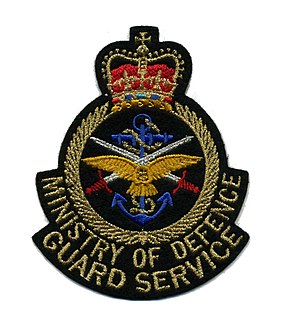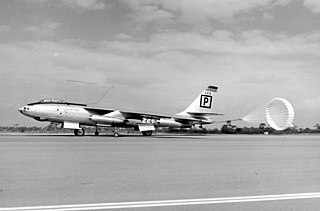
Civil defense or civil protection is an effort to protect the citizens of a state from man-made and natural disasters. It uses the principles of emergency operations: prevention, mitigation, preparation, response, or emergency evacuation and recovery. Programs of this sort were initially discussed at least as early as the 1920s and were implemented in some countries during the 1930s as the threat of war and aerial bombardment grew. Civil-defense structures became widespread after authorities recognised the threats posed by nuclear weapons.

The Ministry of Defence is the British government department responsible for implementing the defence policy set by Her Majesty's Government, and is the headquarters of the British Armed Forces.

The Atomic Weapons Establishment (AWE) is a United Kingdom Ministry of Defence research facility responsible for the design, manufacture and support of warheads for the UK's nuclear weapons. It is the successor to the Atomic Weapons Research Establishment (AWRE) with its main site on the former RAF Aldermaston and has major facilities at Burghfield, Blacknest and RNAD Coulport.

The United Kingdom Atomic Energy Authority is a UK government research organisation responsible for the development of fusion energy. It is an executive non-departmental public body of the Department for Business, Energy and Industrial Strategy (BEIS).

Chemical, biological, radiological and nuclear defence are protective measures taken in situations in which chemical, biological, radiological or nuclear warfare hazards may be present. CBRN defence consists of CBRN passive protection, contamination avoidance, and weapons of mass destruction mitigation.

The Ministry of Defence Guard Service (MGS) is part of the Defence Infrastructure Organisation of the Ministry of Defence, it provides military establishments across the United Kingdom with guarding and patrol services and was established as a response to the Deal Bombing. The Guard Service is one of the few remaining uniformed Civil Service agencies within the UK, and has been named an elite guarding service within the United Kingdom.

Her Majesty's Naval Base, Clyde, primarily sited at Faslane on the Gare Loch, is one of three operating bases in the United Kingdom for the Royal Navy. It is the navy's headquarters in Scotland and is best known as the home of Britain's nuclear weapons, in the form of nuclear submarines armed with Trident missiles.

An authorised firearms officer (AFO) is a British police officer who is authorised, and has been trained, to carry and use firearms. The designation is significant because in the United Kingdom most police officers do not routinely carry firearms, although they can be equipped with tasers. The only forces where officers are routinely armed are the Police Service of Northern Ireland, the Ministry of Defence Police, the Civil Nuclear Constabulary, Belfast Harbour Police and the Belfast International Airport Constabulary.

The US–UK Mutual Defense Agreement, or 1958 UK–US Mutual Defence Agreement, is a bilateral treaty between the United States and the United Kingdom on nuclear weapons co-operation. The treaty's full name is Agreement between the Government of the United States of America and the Government of the United Kingdom of Great Britain and Northern Ireland for Cooperation on the uses of Atomic Energy for Mutual Defense Purposes. It allows the US and the UK to exchange nuclear materials, technology and information. The US has nuclear co-operation agreements with other countries, including France and other NATO countries, but this agreement is by far the most comprehensive. Because of the agreement's strategic value to Britain, Harold Macmillan called it "the Great Prize".

The Danish Emergency Management Agency (DEMA) is a Danish governmental agency under the Ministry of Defence. Its principal task is to manage an operational part who work out of six Emergency Management Centres, and administrative and legalizing part, who supervises the national and municipal rescue preparedness and advises the authorities on matters of preparedness. DEMA works in closely structured co-operation with the EU, UN and several neighbouring countries.
The U.S. Department of Energy/National Nuclear Security Administration's Office of Secure Transportation (OST) provides safe and secure transportation of nuclear weapons and components and special nuclear materials, and conducts other missions supporting the national security of the United States of America.

Royal Naval Armaments Depot Coulport, shortened to RNAD Coulport, on Loch Long in Argyll, Scotland, is the storage and loading facility for the nuclear warheads of the United Kingdom's Trident programme.
Defence Nuclear Accident Response Organisation (NARO) is maintained by the UK Ministry of Defence (MOD) to respond to an accident or incident, including one arising through terrorist acts, involving defence nuclear assets.
Defence Nuclear Material Transport Operations refer to the movements of military Defence Nuclear Materials (DNM) within, to and from the United Kingdom. Defence Nuclear Material Transport Operations are also known as DNM Transportation; Defence Nuclear Material in transit; Nuclear movements; and DNM movements.

The Ministry of Emergency Situations of Azerbaijan Republic is the central executive body within the cabinet of Azerbaijan Republic responsible for protecting the population from natural and manmade disasters. The ministry is headed by Kamaladdin Heydarov.

The Ministry of Defence Police (MDP) is a civilian special police force which is part of the United Kingdom's Ministry of Defence. The MDP's primary responsibilities are to provide armed security and counter terrorism services to designated high-risk areas, as well as uniformed policing and limited investigative services to Ministry of Defence property, personnel, and installations throughout the United Kingdom. The MDP are not military police and should not be confused with the Royal Military Police or any other British Service Police. Service personnel often refer to the MDP by the nickname "MOD plod".

Low flying military training involves military aircraft flying at low altitude to prepare their aircrew, and other military personnel, for nap-of-the-earth flying in wartime. The aircraft types can include advanced trainers, ground-attack aircraft, transports and helicopters.

The Northern Ireland Security Guard Service (NISGS) is a civilian organisation of the Ministry of Defence that provides armed security at military establishments in Northern Ireland.

RAF Lakenheath in Suffolk, one of several air bases in the United Kingdom which was used by the United States Air Force to store nuclear weapons during the Cold War, was the site of accidents involving nuclear weapons, in 1956 and 1961.















